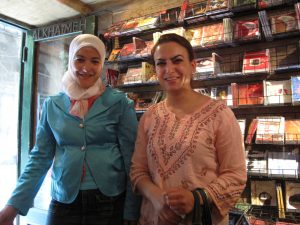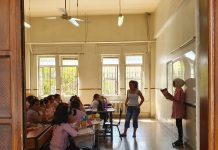Interview with Lubna, recorded by Susan Dirgham in 2010
Extract:
In regard to women’s issues and the equality of the sexes, what are some of the differences of opinion in Syria?
You have a whole range of opinions. For example, men are demanding their rights, like to be equal to the women! They are saying, like, women have more rights than men. Or some say, ‘Oh, no, we have lots of things to work on’. So you have the two extremes and in-between. For example, men say women in Syria get maternity leave, but men don’t get (paternity leave). So that is a big issue here, especially for newly established families, and the man wants to spend some time with his new-born baby, (something) men don’t have the chance to do here in Syria. But some of the people who want more rights for women (acknowledge) there is so much to do, especially when it comes to social liberation, but then I think when it comes to social liberation, it is not going to come like this, in an instant. (Loubna clicks her fingers.) It is not going (to be as simple as a woman saying) okay, I’m going to take off this hijab and I’m going to dress freely. It’s not like this. I think the Western world went through many phases in order to reach this stage. So I don’t think (avoiding) stages of development, if you can call it ‘development’, according to the Western concept of development, it’s no good to (avoid) them. It will not be normal ‘development’. It will be like forcing a society to change 180 degrees. And apart from that, Europe took this long process to get to where it is right now. It did it out of its choice. It was not forced on it, so that is the main thing. If you are going to force me to do something, I will feel reluctant, even if I am open to the idea.
So women in Syria aren’t waiting for the West to save them?

I’m sorry to disappoint the West. No. You know each one of us has his or her battles. Each one of us fights his or her demons. So we will do the fighting. We are strong enough.























